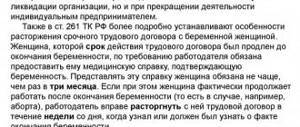Is it possible?
Art. 261 of the Labor Code of the Russian Federation indicates that an employment contract with an employee during her pregnancy cannot be terminated at the initiative of the employer , with the exception of two cases:
- The individual entrepreneur ceases his business activities or the organization is liquidated - either on its own or by a court decision (read about the specifics of dismissing a pregnant woman when liquidating an organization before maternity leave).
- If a woman works under a fixed-term contract during the absence of the main employee and she cannot be transferred to another job taking into account her state of health (you can find out whether a pregnant woman employed under a fixed-term employment contract can be fired from her job here).
In all other cases, the answer to the question “is it possible to fire a pregnant woman?” is negative. Even if she entered into a fixed-term contract and its duration has already expired, the employer is obliged to extend the contract until the birth or until the end of the maternity leave.
Reference. The law does not give the employer the right to dismiss such an employee even for absenteeism - he only has the right to subject her to other disciplinary punishments provided for by the internal regulations of the enterprise and not contrary to the law (for example, to deprive her of a bonus, etc.).
Read more about whether it is possible to fire a pregnant woman for absenteeism in our material.
But does this mean that a pregnant woman cannot terminate the employment contract herself? No. Art. 261 does not contain such a restriction, which means that the provisions of Art. 80 Labor Code of the Russian Federation. Even during pregnancy, an employee has the right to submit an application and resign at her own request. However, both parties to the employment contract need to take into account a number of features regarding such dismissal.
We recommend that you read our other articles about whether a pregnant employee can be expelled or laid off:
- on probation;
- according to the article;
- on staff reduction;
- when the state is disbanded.
Reinstatement at work after dismissal of a pregnant woman
Article 234 of the Labor Code of the Russian Federation. The employer's obligation to compensate the employee for material damage caused as a result of illegal deprivation of his opportunity to work. The employer is obliged to compensate the employee for the earnings he did not receive in all cases of illegal deprivation of his opportunity to work. Such an obligation, in particular, arises if earnings are not received as a result of: illegal removal of an employee from work, his dismissal or transfer to another job; the employer’s refusal to execute or untimely execution of the decision of the labor dispute resolution body or the state legal labor inspector to reinstate the employee to his previous job; delay by the employer in issuing a work book to an employee, or entering into the work book an incorrect or non-compliant wording of the reason for the employee’s dismissal.
Procedure
Submitting an application
Art. 80 of the Labor Code of the Russian Federation provides that termination of an employment contract at the employee’s own will occurs only on the basis of his written application. Therefore, the first step towards dismissing a pregnant employee is to submit this application to her (we talked about how to dismiss a pregnant employee legally here). The document can be submitted:
- To the HR department of the enterprise.
- The head of the structural unit in which a woman works.
- Directly to the head of the entire enterprise or personally to the individual entrepreneur.
The specific filing procedure is determined by local regulations in force at the enterprise.
According to Art. 80 of the Labor Code of the Russian Federation, when dismissing at one’s own request, the rule of two-week “working off” applies. This means that the 14-day period begins to run from the day after the application is submitted. It is given to the employer to find another employee to replace the quitting employee.
At the end of this period, the pregnant woman has the right to end her working activity: on the last day of the term, all her relations with the employer are terminated.
The warning period established by Art. 80 is not mandatory - termination of the employment contract may occur earlier. But although the employer has the right to fire a pregnant woman without working time, she is not obligated to do so - labor legislation does not contain such a condition.
If the head of an enterprise or individual entrepreneur does not give his consent to early dismissal, even a pregnant woman will have to work out the entire notice period.
Important! However, if a woman is placed on confinement before maternity leave or is in a medical institution for other reasons, she has the right to demand termination of the employment contract within the period set by her, since she does not have the opportunity to continue to fulfill her duties.
Preparation of personnel documents
After the application has been submitted to the employer, the following documentation is completed:
- Order of dismissal in form No. T-8 or T-8a. It indicates the basis for dismissal (own desire) and the article of the Labor Code of the Russian Federation on the basis of which the dismissal is made (Article 80). The employee gets acquainted with the order by signing it.
- Certificate of earnings for the last 2 months. It is issued along with the work book.
- Entry into the work book. It is carried out in strict accordance with the order.
- Calculation note (Form No. T-61) for payment to the employee of all funds due to her.
- Certificate of information sent to the Pension Fund (clauses 2 – 2.2 of Article 11 of Federal Law No. 27-FZ of 04/01/1996).
- Entry in the employee’s personal card (form No. T-2). The employee also gets acquainted with the recording by signing it.
All of the above standard forms are used if the enterprise has not developed its own forms. This right has been in effect since 2013. However, most organizations still use standard forms approved by the State Statistics Committee of the Russian Federation in 2004.
Calculation and issuance of a work book
On the last day of work, the employee must be paid all the money that she has earned but has not yet received. In addition, a work book is issued on the same day.
If the employee did not work on the last day of the employment contract, she will receive the money the next day after she requests payment.
How to get maternity leave?
A pregnant but dismissed woman is entitled to maternity payments from the employer's budget only in the event of illegal termination of the contract and subsequent reinstatement.
In other situations, it is worth asking other authorities about how to get maternity leave if you quit your job and become pregnant.
In particular, social protection authorities provide support to low-income families (if they have an officially confirmed status).
We are not talking about large sums, however, a young mother can count on financial assistance. For example, she has the right to count on a one-time benefit from the social security department if the father of the unborn child is not her legal spouse or if the man has no official income.
To receive assistance, an appropriate application must be submitted accompanied by a certain set of documents, which includes:
- application form;
- child's birth certificate;
- SNILS of parents;
- certificate of family composition issued at the mother’s registered address;
- passports of men and women;
- employment history;
- a document confirming that similar payments have not been previously issued.
Papers must be submitted to the social protection department no later than six months from the date of birth of the baby. An appeal after 6 months loses the right to consideration and receipt of payment.
Also, if a woman, within 30 days of leaving work, contacts the employment service, she will receive:
- monthly unemployment benefit;
- maternity payments until the child turns one and a half years old.
While a woman is on maternity leave, the employment service does not have the right to remove her from the register, unlike ordinary unemployed people. She also does not have to report to the labor exchange every month in connection with her self-search for work.
A pregnant woman should know that her interesting position is not a reason for the employment service to deprive her of the opportunity to find a job that she can start after the end of her labor and employment leave.
Dear readers! To solve your problem right now, get a free consultation
— contact the duty lawyer in the online chat on the right or call: +7 Moscow and region.
+7 St. Petersburg and region. 8 Other regions of the Russian Federation You will not need to waste your time and nerves
- an experienced lawyer will take care of all your problems!
What payments are due?
If a woman quits her job during pregnancy, she should know what payments she is entitled to:
- Salary for the part of the month worked.
- Compensation for unused vacation (for the part of the year worked).
However, you need to remember: the former employer is no longer obliged to pay benefits for pregnancy, childbirth and child care from the moment of dismissal.
The exception is cases when “maternity leave” occurred less than a month after dismissal, and in this case the dismissal at one’s own request was associated with certain circumstances recorded by order of the Ministry of Health and Social Development of Russia dated December 23, 2009 No. 1012n. These include:
- Moving to your husband or with your husband to his new place of work.
- An illness that makes it impossible to continue working or living in a given area.
- Caring for sick family members.
Here you should also be guided by Art. 1.4 and paragraph 2 of Art. 5 No. 255-FZ concerning insurance (in this case, medical and social) coverage.
I quit and found out I was pregnant
But they can receive benefits only if their disability occurs as a result of illness or injury (including in connection with artificial termination of pregnancy or in vitro fertilization).
application from the parent for the assignment of benefits; a certificate of birth of your child, which was issued upon registration at the registry office; your child's birth certificate; a certificate from the other parent’s place of work stating that he was not provided with benefits; if the second parent does not work anywhere - a certificate from RUSZN stating that this parent did not receive benefits; if the mother is single, then you must additionally provide a certificate from the registry office about the inclusion of information about his father in the child’s birth certificate.
If the boss forces a woman to leave
On a note. The legislation provides for “maternity” leave for pregnant employees - that is, for pregnancy and childbirth, as well as for child care.
All this time, the woman remains on the staff of the enterprise, she is supposed to make payments to the mandatory funds - and therefore this situation is extremely unprofitable for the employer.
As a result, unfortunately, many of them use pressure on their employees - they force them to resign of their own free will.
What should a woman who finds herself in such a situation do? First of all, she needs to take several steps:
- Do not write statements under any circumstances! If a document, even if written under pressure, was drawn up and personally signed by an employee, the likelihood of winning the case and achieving reinstatement or at least compensation becomes negligible.
- If possible, record the fact of pressure. Testimony from loyal witnesses, audio or video recordings, etc. will come in handy. The main thing is to prove that there was a demand from the employer to resign.
- File a complaint about the employer’s actions with the regulatory authorities (Rostrudinspektsiya or directly to the prosecutor’s office). The complaint must accurately reflect the circumstances of the case and express the demand that the perpetrator be brought to justice.
- If the dismissal took place, appeal it to the court.
It must be remembered that a pregnant woman cannot be fired at the initiative of the employer. Even if she violates discipline, the employment contract can only be terminated on the initiative of the employee or by agreement of the parties.
Reinstatement of a pregnant woman at work after dismissal
Good afternoon I really hope for your professional qualified help! I worked at Tander JSC (Magnit chain of stores). 02/25/2020 I was forced by an ultimatum to resign from there of my own free will. Literally 2 weeks later I found out that I was pregnant. I registered for pregnancy at our clinic on 04/04/2020, where they gave me a gestational age of 9 weeks and 4 days (I can provide a certificate). It turns out that at the time of dismissal my pregnancy was 4 weeks and 6 days. Is it possible to reinstate me to my former job? I don’t know if it’s possible to get a recording of my director’s call to me, where she, in the form of an ultimatum, forced me to write a letter of resignation. If yes, then I can prove this fact. No, then I can provide witnesses, at least 3 people, who can confirm that I was constantly subjected to pressure from my director and supervisor. Please help me with your advice, what should I do and is recovery even possible?
Responsibility
If an employer, through pressure, threats or blackmail, forced an employee to resign, he will have to answer according to the law. In this case the following will apply:
- Administrative legislation – Art. 5.27 Code of Administrative Offenses of the Russian Federation.
- Criminal Code – Art. 145 of the Criminal Code of the Russian Federation.
Note! If the Code of Administrative Offenses of the Russian Federation provides only punishment for discrimination, then Art. 145 of the Criminal Code of the Russian Federation directly speaks of the unjustified dismissal of pregnant women.
The culprit will face punishment in the form of:
- a fine of up to 200 thousand rubles or other income for one and a half years;
- or compulsory work up to 360 hours.
It should be taken into account that the punishment, although relatively modest by criminal standards, entails a criminal record and all the legal consequences provided for by the Criminal Code of the Russian Federation.
Can an employer refuse?
The opposite question is also possible: can the head of an enterprise or individual entrepreneur refuse his pregnant employee who wants to quit? Are there grounds for refusing to terminate an employment contract?
It should be noted here: the Labor Code of the Russian Federation does not contain such grounds in principle. Regardless of the state of pregnancy, Art. 80 of the Labor Code of the Russian Federation does not provide for the opportunity for an employer to evade termination of an employment contract.
Moreover, Art. 4 of the Labor Code of the Russian Federation directly prohibits forced labor - and this is precisely what will be the actions of an employer who refuses to terminate the employment relationship at the request of the employee.
Even if the employee is a unique specialist, the employer has the right only to persuade her to stay at work - but not to prevent her from dismissal.









